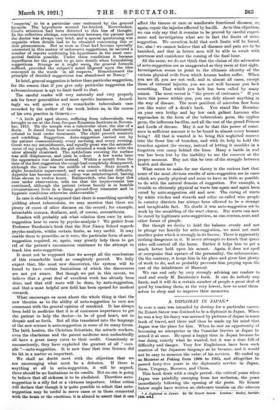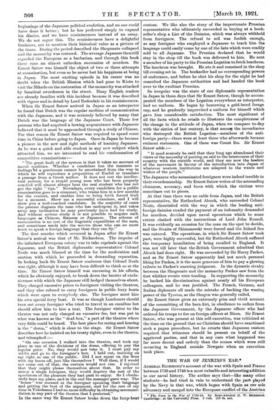A DIPLOMAT IN JAPAN.*
IF ever a man was intended by destiny for a particular career, Sir Ernest Satow was destined to be a diplomat in Japan. When he was a boy his fancy was aroused by pictures of Japan in some book of travel, and there and then he made up his mind that Japan was the place for him. When he saw an opportunity of becoming an interpreter in the Consular Service in Japan he seized it at once. He spent a happy time in Japan because he was doing exactly what he wanted, but it was a, time full of difficulty and danger. Very few Englishmen have been such masters of the Japanese language as he became, and it would not be easy to measure the value of his services. He ended up as Minister at Peking from 1900 to 1905, and altogether he passed forty-five years in the diplomatic service in Japan, Siam, Uruguay, Morocco, and China.
This book deals with a single period—the critical years when Japan was painfully emerging from her seclusion, the years immediately following the opening of the porta. Sir Ernest Satow might have written an elaborate treatise on the obscure *A Diplomat in Jame. By Sir Ernest Wow. London : Seeley. &Tyke. 132s. ast4
beginnings of the Japanese political evolution, and no one could have done it better ; but he has preferred simply to expand his diaries, and we have reminiscences instead of an essay. We do not regret this. The reminiscences have a delightful freshness, not to mention their historical value as a picture of the times. During the period described the Shogunate collapsed and the monarchy was restored. The average Japanese thenstill regarded the European as a barbarian, and through this book there runs an almost unbroken succession of murders. Sir Ernest Satow was himself the object of two or three attempts at assassination, but even so he never lost his happiness at being in Japan. The most exciting episode in his career was no doubt when the British Mission which had gone to Kioto to visit the Mikado on the restoration of the monarchy was attacked by fanatical swordsmen in the street. Many English readers are already familiar with this incident because it was described with vigour and in detail by Lord Redesdale in his reminiscences.
When Sir Ernest Satow arrived in Japan as an interpreter he found that Dutch was the regular medium of communication with the Japanese, and it was seriously believed by many that Dutch was the language of the Japanese Court. Those few persons who had acquired a bowing acquaintance with Japanese believed that it must be approached through a study of Chinese. For that reason Sir Ernest Satow was required to spend some time in China before going to Japan. Once in Japan he became a pioneer in the new and right methods of learning Japanese. As he was a quick and able student in any new subject which attracted him, we are interested to read his condemnation of competitive examinations :—
" The great fault of the system is that it takes no account of moral qualities. Whether a candidate has the manners or feelings Of a gentleman cannot be ascertained from the way in which he will reproduce a proposition of Euclid or translate a passage from a Greek author. It does not test the intellec- tual powers, for a stupid young man who has been properly coached will almost always beat the real student who has not got the right " tips." Nowadays, every candidate for a public examination goes to a crammer, who trains him in a few months for the contest, and enables him to bring forth forced fruit for a moment. Show me a successful examinee, and I will show you a well-coached candidate. In the majority of cases the process disgusts the man who has undergone it, and takes away any inclination he may previously have had for study. And without serious study it is not possible to acquire such languages as Chinese, Siamese or Japanese. The scheme of examination is no test of the linguistic capabilities of the men, and sometimes sends into the service those who can no more learn to speak a foreign language than they can fly."
The first murder which occurred in Japan after Sir Ernest Satow's arrival was that of Mr. Richardson. The impulse of the infuriated European colony was to take reprisals against the Japanese, and the British diplomatic representative Colonel Neale was much blamed at the time for the moderation and caution with which he proceeded in demanding reparation. In looking back Sir Ernest Satow confesses that Colonel Neale was right, although it may have been difficult to think so at the time. Sir Ernest Satow himself was unceasing in his efforts, which he obviously enjoyed, to break down the barrier of exclu- siveness with which the Japanese still hedged themselves about. They charged excessive prices to foreigners visiting the theatres, and they also refused to carry foreigners in public ferry boats which were open to everybody else. The foreigner must hire his own special ferry boat. It was as though Londoners should turn out every foreigner who tried to travel in an omnibus but should allow him to hire a taxi. The foreigner visitor to the theatre was not only charged an excessive fee, but was put in what was known as the " deaf-box," a part of the theatre where very little could be heard. The beet place for seeing and hearing is the " doma," which is close to the stage. Sir Ernest Satow describes how he insisted on his treaty rights, even in the theatre, and triumphed :- " On one occasion I walked into the theatre, and took my place in one of the divisions of the dews, offering to pay the regular price. No, they would not take it. I must pay my ichibu and go to the foreigner's box. I held out, insisting on my right as one of the public. Did I not squat on the floor with my boots off, just like themselves ? Well then, if I would not come out of that, the curtain would not rise. I rejoined that they might please themselves about that. In order to annoy a single foreigner, they would deprive the rest of the spectators of the pleasure they had paid to enjoy. So I obstin- ately kept my place, and in the end the manager gave way. The house ' was amused at the foreigner speaking their language and getting the best of the argument, and for the rest of my time in Yokohama I had no more difficulty in obtaining aecommoi, dation in any part of the theatre that I preferred."
In the same way Sir Ernest Satow broke down the ferry-boat custom. We like also the story of the importunate Prussian representative who ultimately succeeded in buying at a book- seller's shop a List of the Daimios, which was always withheld from foreigners. The refusal to sell was foolish enough, as any foreigner who employed a Japanese to teach him the language could easily come by one of the lists which were readily sold to all Japanese. The Prussian declared that he would stay in the shop till the book was delivered to him. He sent a member of his party to the Prussian Legation to fetch luncheon. The luncheon was brought. He ate it and remained in the shop till evening set in. The bookseller had no corresponding powers of endurance, and before he shut his shop for the night he had consulted the Japanese authorities and had handed the book over to the exultant Prussian.
So irregular was the state of our diplomatic representation in Japan in those days that Sir Ernest Satow, though he accom- panied the members of the Legation everywhere as interpreter, had no uniform. He began by borrowing a gold-laced forage cap, and he gradually improvised a uniform for himself which gave him considerable satisfaction. The most significant of all the facts which he retails to illustrate the completeness of the change in the attitude of Japan, when we compare to-day with the sixties of last century, is that among the incendiaries who destroyed the British Legation—members of the anti- foreign party—there were at least three who afterwards became eminent statesmen. One of these was Count Ito. Sir Ernest Satow adds :—
" It need scarcely be said that they long ago abandoned their views of the necessity of putting an end to the intercourse of their country with the outside world, and they are now the leaders of the movement in favour of the introduction into Japan of whatever western institutions are adapted to the wants and wishes of the people."
The Japanese who assassinated foreigners were indeed terrible in their swordsmanship. Sir Ernest Satow writes of the astounding cleanness, accuracy, and force with which the victims were
sometimes cut to pieces.
At that time there was no cable from Japan, and the British representative, Sir Rutherford Alcock, who succeeded Colonel Neale, dissatisfied with the way in which the leading anti- foreign daimios evaded the payment of an indemnity demanded for murders, decided upon naval operations which to some extent clashed with the instructions of Lord John Russell.
It was evidently an occasion for the man on the spot to decide, and the Straits of Shimonoseki were forced and the Inland Sea was entered. The operations, in which Sir Ernest Satow took part, were highly successful, but Sir Rutherford Alcock suffered the temporary humiliation of being recalled to England. It was not till later that the British Government admitted that Alcock had done right. He was succeeded by Sir Harry Parkes, and as Sir Ernest Satow apparently had not much personal liking for Parkes, it is the more generous of him to pay a glowing tribute to Parkes's unerring judgment. In the dynastic rivalry
between the Shogunate and the monarchy Parkes saw from the first whither events were tending. In supporting the monarchy he backed his discrimination against nearly all his European colleagues, and he was justified. The French, German, and Italian diplomats all made the mistake of backing the waning power of the Tycoon, as the Shogun was generally called.
Sir Ernest Satow gives an extremely grim and vivid account of the committing of the hara-kiri, in obedience to orders from the Japanese Government, by the Japanese officer who had ordered his troops to fire on foreign officers at Bizen. Sir Ernest Satow, who was present at this self-execution, was criticized at the time on the ground that no Christian should have sanctioned such a pagan procedure, but he retorts that Japanese custom required that witnesses should be present on behalf of the aggrieved parties, and that in any case what happened was far more decent and orderly than the scenes which were still occurring in England outside Newgate when an execution took place.



































 Previous page
Previous page